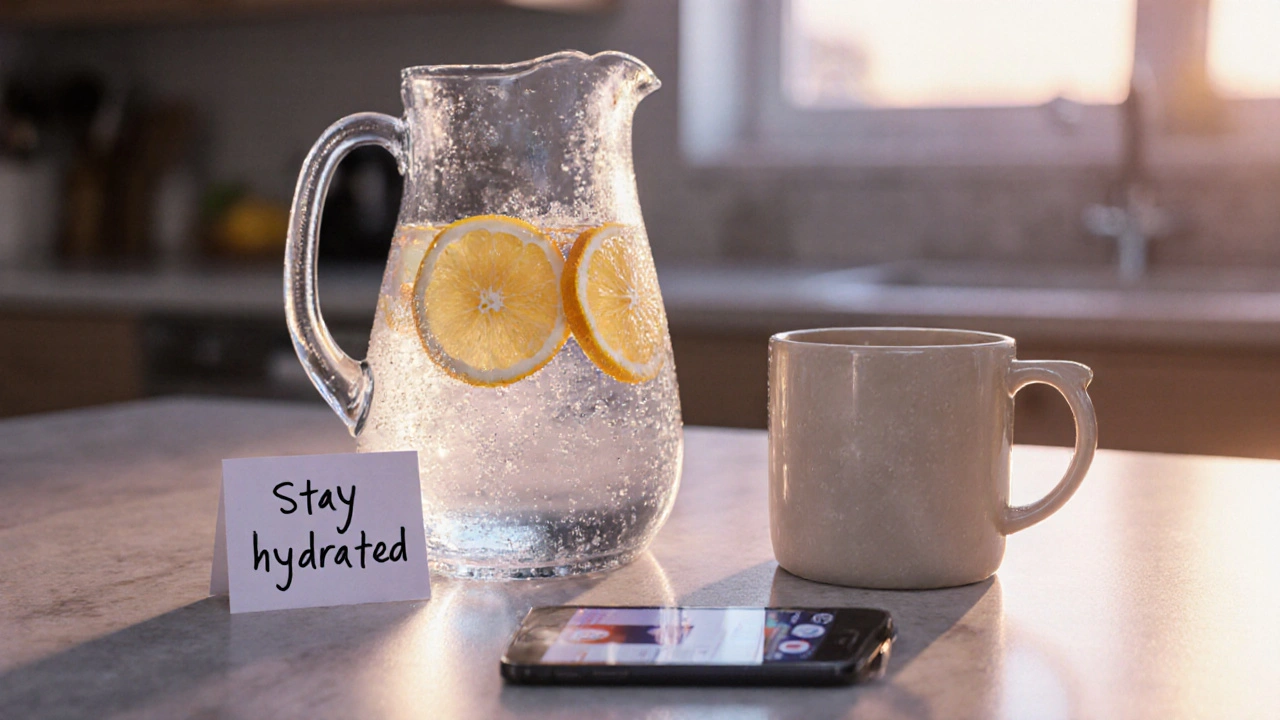Dry mouth is a condition, medically known as xerostomia, where the salivary glands don’t produce enough saliva. It may sound minor, but the lack of moisture can ripple through everyday conversations, meals, and even the way you feel about yourself.
Quick Takeaways
- Dry mouth reduces saliva, leading to bad breath, swallowing trouble, and cracked lips.
- These physical signs often trigger self‑consciousness in social settings.
- Hydration, saliva‑stimulating foods, and medication reviews are the first line of defense.
- Open communication and simple confidence‑boosting tricks help you stay present.
- See a dentist or doctor if symptoms persist for more than a few weeks.
What Causes Dry Mouth?
Several factors can shut down saliva production:
- Dehydration - Not drinking enough water, especially in dry climates or after intense exercise.
- Side effects of medications such as antihistamines, antidepressants, and blood pressure pills.
- Medical conditions like diabetes, Parkinson’s disease, or Sjögren’s syndrome.
- Stress and anxiety - the “fight‑or‑flight” response can temporarily lower saliva flow.
- Smoking or excessive alcohol consumption, which irritate oral tissues.
Understanding the root cause lets you target the right fix, whether it’s a simple habit change or a medication adjustment.
How Dry Mouth Undermines Social Confidence
Think about the last time you felt uncomfortable because of bad breath. That moment is often tied to a drop in confidence. When saliva is scarce, you may notice:
- Dry, rough tongue that makes speech less fluid.
- Difficulty forming certain sounds like “s” or “th,” which can sound slurred.
- Visible cracks on the lips, adding a visual cue that you’re not at your best.
- Persistent bad breath, even after brushing.
These signs send subtle signals to others and to yourself that something’s off, prompting self‑monitoring or even avoidance of group settings.
Physical Signs That Influence Social Interactions
Beyond the mental strain, dry mouth manifests in concrete ways that affect day‑to‑day life:
- Bad breath - Without enough saliva to wash away food particles, bacterial growth spikes.
- Difficulty eating crunchy or salty foods, leading you to decline meals with friends.
- Increased thirst that forces you to sip water constantly - a habit that can feel socially awkward.
- Dry, sore throat that makes you cough during conversations.
- Greater risk of dental decay, which can cause visible cavities or fillings that affect smile confidence.
Recognizing these clues early helps you act before they become embarrassment triggers.

Practical Strategies to Keep Your Mouth Moist
Here’s a step‑by‑step plan you can start today:
- Hydration first: Aim for at least 2liters of water daily. Sip gradually instead of gulping to keep saliva glands active.
- Chew sugar‑free gum or suck on sugar‑free lozenges. Xylitol‑based options not only stimulate flow but also combat cavity‑causing bacteria.
- Include saliva‑boosting foods: apples, carrots, and celery trigger the chewing reflex.
- Limit alcohol, caffeine, and sodas - they dry out oral tissues.
- Use a humidifier at night if you breathe dry air.
- Review your medication list with a doctor; sometimes a dosage tweak or an alternative drug can help.
- Practice gentle oral hygiene: a soft‑bristled toothbrush, fluoride toothpaste, and a fluoride rinse without alcohol.
- Consider over‑the‑counter saliva substitutes (mouthwash or sprays) if natural methods aren’t enough.
These habits not only restore moisture but also signal to your brain that your mouth is “taken care of,” reducing anxiety during chats.
Boosting Confidence While Managing Dry Mouth
Even with the best care routine, you might still feel self‑conscious. Try these confidence‑building tactics:
- Carry a stylish water bottle - sipping looks purposeful, not odd.
- Practice a short, friendly greeting in front of a mirror; smooth speech builds muscle memory.
- Explain briefly if you need a moment to swallow or sip - most people appreciate honesty.
- Focus on body language: maintain eye contact, smile, and adopt an open posture to convey confidence.
- Schedule regular check‑ins with a dentist; seeing clean, healthy teeth reinforces a positive self‑image.
When the conversation flows, the dry mouth becomes a background detail rather than a spotlight.
When to Seek Professional Help
If you notice any of these red flags, it’s time to book an appointment:
- Persistent dry mouth for more than 4weeks.
- Frequent mouth sores, burning sensations, or difficulty swallowing.
- Rapid tooth decay despite good brushing.
- Medication side‑effects that feel unmanageable.
Dental professionals can assess saliva flow, recommend prescription‑strength saliva stimulants, or provide custom mouthguards for nighttime protection.
Natural Remedies vs Over‑the‑Counter Options
| Feature | Natural Remedies | OTC Products |
|---|---|---|
| Cost | Low - water, gum, fruits | Medium - sprays, gels |
| Convenience | High - always available | Moderate - need to carry |
| Side Effects | None when food‑based | Possible alcohol or sugar content |
| Duration of Relief | Short‑term (minutes) | Longer (up to 2‑3hours) |
| Additional Benefits | Dental health (xylitol), fiber | Antimicrobial agents |
Most people find a hybrid approach works best: stay hydrated and chew gum throughout the day, then use a mouth spray before a long meeting.

Frequently Asked Questions
Can stress really cause dry mouth?
Yes. Stress triggers the sympathetic nervous system, which reduces saliva flow. Managing stress with breathing exercises or short walks often improves oral moisture.
Is it safe to use alcohol‑free mouthwash daily?
Alcohol‑free formulas are designed for frequent use and won’t dry out the mouth further. Look for ones containing glycerin or aloe for extra soothing.
How much water should I drink to prevent dry mouth?
Aim for about 2liters (8 cups) a day, but adjust if you’re active, live in a hot climate, or consume caffeine. Sipping steadily is more effective than large gulps.
Do sugar‑free lozenges actually help?
Yes. They stimulate chewing and salivation. Choose lozenges with xylitol - it reduces cavity‑causing bacteria while keeping your mouth moist.
When should I see a dentist for dry mouth?
If you notice frequent sores, rapid tooth decay, or the condition lasts longer than a month, schedule a dental visit. Early intervention can prevent long‑term damage.


Written by Felix Greendale
View all posts by: Felix Greendale